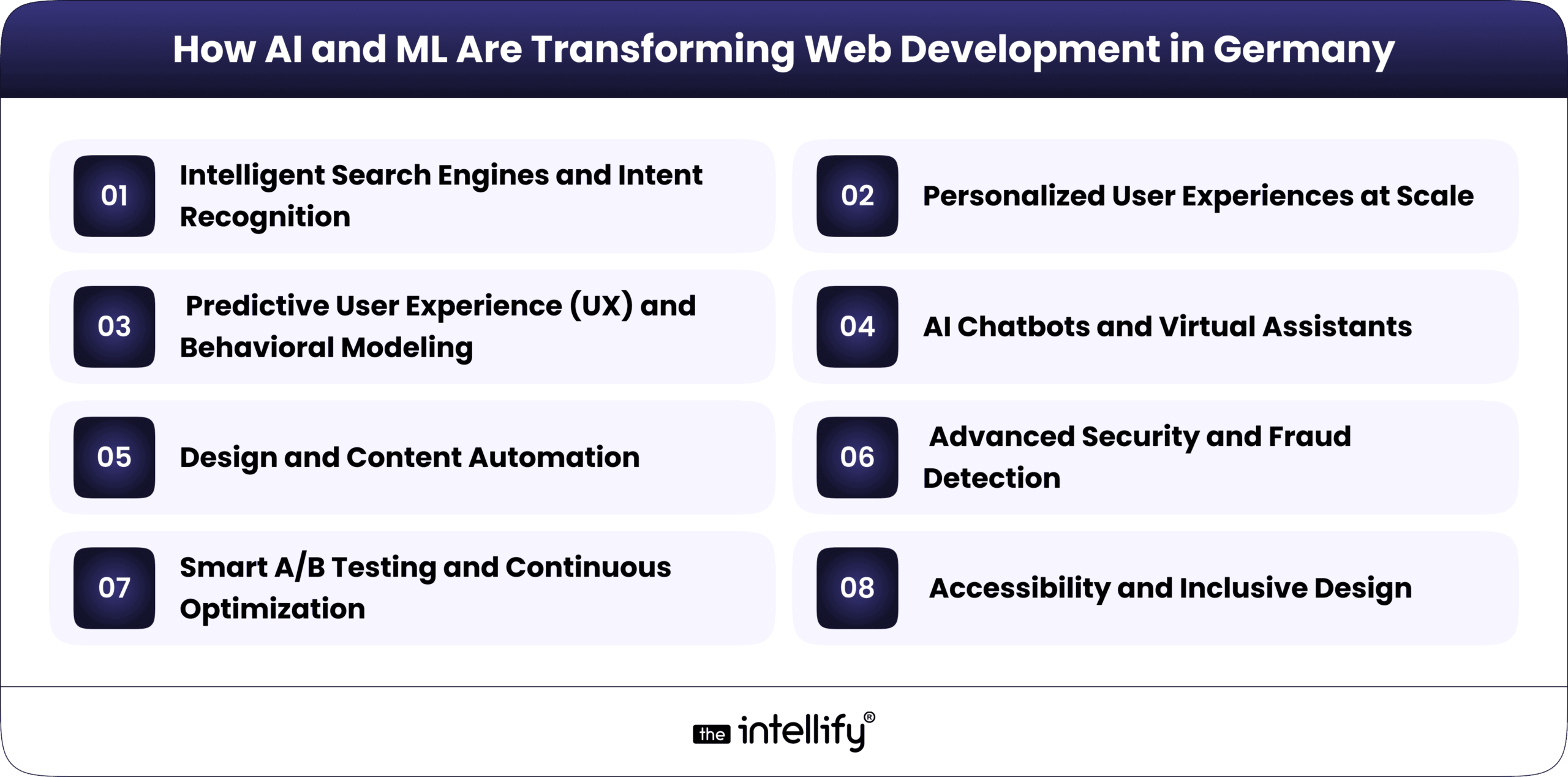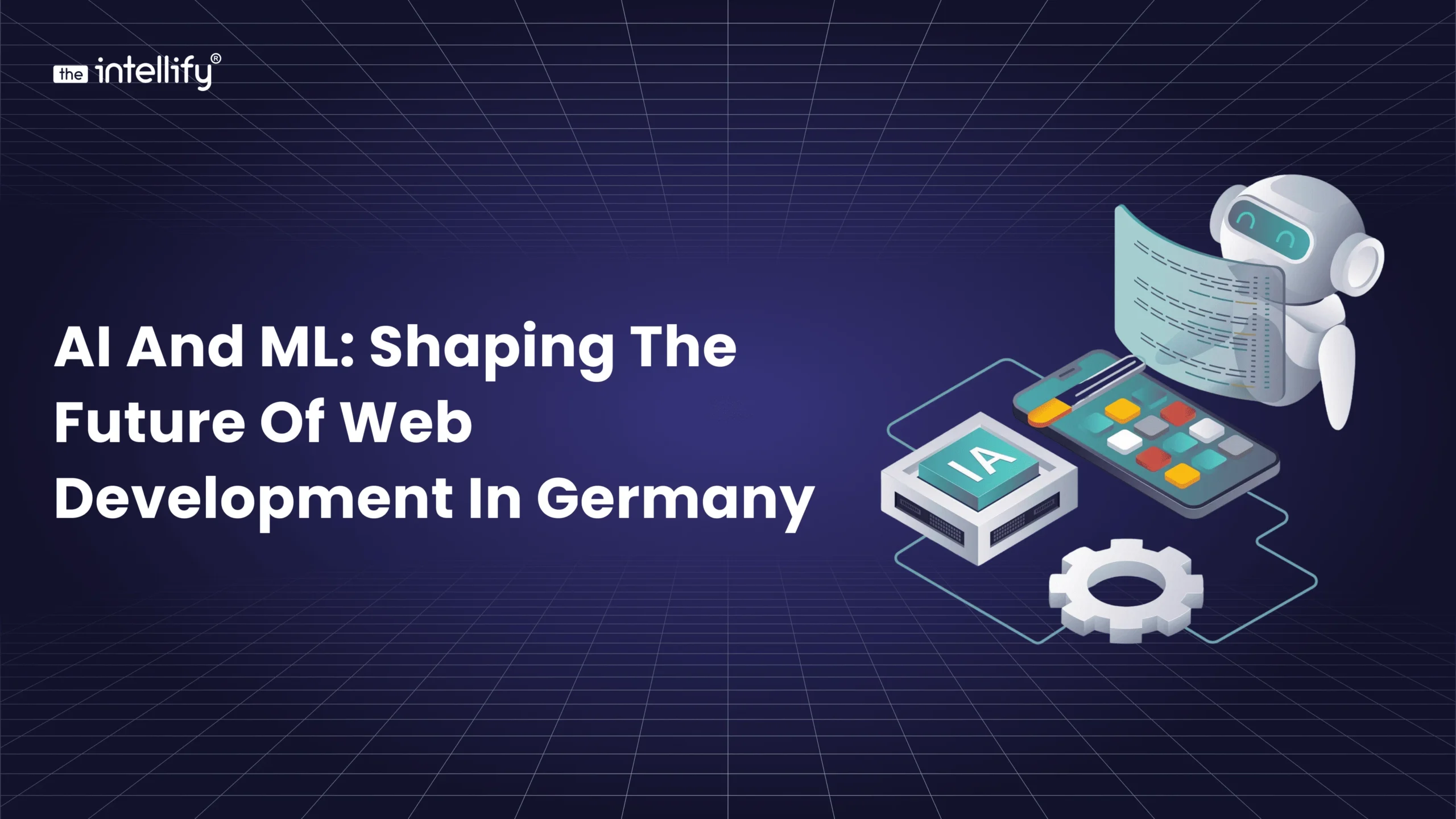Over the past few years, web development has seen a subtle but strong revolution and nowhere is this more apparent than in Germany’s expanding digital economy. As companies seek smarter, quicker, and more tailored web experiences, two technologies are coming to the forefront: AI and ML, i.e., Artificial Intelligence and Machine Learning.
These technologies are not buzzwords anymore. Now, they’re actually changing the manner in which websites are built, how individuals use them, and how businesses build value in a digital competitive economy. Let’s walk through this blog and see how AI and ML are shaping web development trends in Germany, backed by recent facts, real-life examples, and where this revolution can go from here.
Why Germany Is Ripe for AI-Driven Web Innovation
Germany is one of the leading countries in Europe when it comes to the adoption of new information technologies. The same report by the European Commission places Germany among the top five countries in Europe of using technology for development and growth of economic activities. But like every rose has a thorn, the expanding digital economy poses a low number of skilled developers and a greater digital consumers in Germany, which signals demand for more scalable solutions.
The answer is Advanced Artificial Intelligence (AI) and Machine Learning (ML). AI and ML give German companies more resource gap opportunities, fast, tailored web experiences, and competitive data markets.
Here are a few primary factors of this transformation:
- Demand for Personalization: German consumers expect clean, functional and personalized digital experiences.
- Skilled Workforce Shortage: There is a shortage of experienced developers, which is why AI tools are a must as they considerably make it easier for teams to accomplish more with less resources.
- Data-Driven Decision Making: German companies increasingly rely on data to improve customer service and website functionalities.
How AI and ML Are Transforming Web Development in Germany

1. Intelligent Search Engines and Intent Recognition
Searching for information using traditional keywords is being replaced by AI-powered solutions that understand user intent. In Germany, online shopping sites and service providers increasingly rely on Natural Language Processing (NLP) to enable smart search bars.
Example: An AI-driven search tool on the site of a German electronics retailer website can understand the phrases like smartphone mit guter Kamera unter 400 Euro (smartphone with a good camera under 400 euros) not only locate the right product but also show relevant filters in real time.
Impact:
- Reduces bounce rate by up to 30%
- Increases conversion by improving search relevancy
2. Personalized User Experiences at Scale
German consumers value fast, personalized digital experiences. AI and ML technologies help websites to dynamically update on-screen content, structure, and CTA buttons in real time based on individual behavior.
Use Cases:
- Travel websites offering location-specific holiday packages
- E-commerce sites offering personalized product recommendations
- News websites prioritizing articles based on user reading history
Stat: As per a 2024 McKinsey study report, personalization can reduce acquisition costs by up to 50% and can boost revenues by 5-15% which results a 10 to 30% increase in marketing ROI.
3. Predictive User Experience (UX) and Behavioral Modeling
Machine learning enables websites to forecast what users will do next. For instance, a financial services website can walk users through complicated forms by forecasting next inputs or auto-filling frequent answers.
Benefits for German businesses:
- Streamlined user journeys
- Reduced form completion abandonment rates
- Increased user satisfaction and loyalty
4. AI Chatbots and Virtual Assistants
Industry websites in Germany are adopting AI chatbots that offer instant assistance in English and German. These tools can:
- Respond to FAQs
- Guide users to the right services or products
- Schedule appointments or collect user feedback
Example: Zeitgold, a Berlin-based startup uses AI bots for client onboarding in their accounting SaaS platform which reduces onboarding time by 40%.
Stat: Gartner predicts that by 2025, 70% of all customer interactions on websites will involve machine learning or AI-based applications.
5. Design and Content Automation
Designers and developers have started taking advantage of AI capabilities that assist in wireframe generation, UI improvement, and content block creation. Tools like Figma with AI plugins or copy.ai are making this possible.
Real-world usage in Germany:
- Agencies using AI to prototype client websites more faster and efficiently
- Media companies creating SEO-optimized content headlines and product descriptions
6. Advanced Security and Fraud Detection
Security remains a top concern in German web development due to strict GDPR compliance and data protection regulations. Machine Learning is being applied to identify suspicious patterns that pose a security threat and prevent fraud.
Examples of AI-driven security implementations:
- Financial sites detecting phishing scams.
- E-commerce platforms preventing fake purchase transactions.
7. Smart A/B Testing and Continuous Optimization
A/B testing is one of the primary testing mechanisms for Web developers. With AI, it’s now easier than ever. Instead of firing one test at a time and interpreting results, AI tools can:
- Conduct and analyze multi-variable testing.
- Learn which elements drive better outcomes
- Automatically optimize layout, CTA buttons, and content
Stat: According to Adobe’s Digital Trends 2024 report, AI-powered tools can accelerate testing cycles by 60%.
8. Accessibility and Inclusive Design
AI-driven technologies also enhance accessibility and inclusivity by modifying website content for people with disabilities. ML models can detect and fix accessibility issues, such as contrast ratios or missing alt text.
Impact in Germany:
- Helps compliance with accessibility standards (BITV 2.0)
- Expands potential audience reach
- Builds brand trust and inclusivity
Real Life Use Cases from the German Market
- Retail & E-Commerce: AI integration into the retail and e-commerce businesses has been witnessed at Zalando and Otto Group, where AI systems recommend products and even facilitate checkout process.
- Banking & Finance: German fintech companies are implementing conversation bots as well as forecasting tools to improve customer support and reduce abandonment rates on application forms.
- SaaS Startups: AI-based web analytics and automated onboarding funnels are helping software providers in improving customer retention.
What’s Next? AI and ML Trends in German Web Development
The future is about simplicity and intelligence working hand-in-hand. As AI tools become more accessible and powerful, we’ll likely see:

For companies operating in Germany, the key will be adopting AI thoughtfully starting small, measuring results, and scaling what works.
What to Consider When Integrating AI in Web Development
While focus are clear, businesses should also keep a few things in mind when implementing AI on their websites:
- Start with a clear problem to solve, not with the technology itself.
- Ensure data privacy and GDPR compliance, especially when collecting user data for personalization.
- Don’t automate everything, AI should make the experience better for the user, not replace human touch.
It is also important to choose tools and platforms that integrate easily with your existing tech stack. Luckily, most contemporary web frameworks and content management systems these days come equipped with built-in AI features or provide easy API connections to advanced AI tools.
Final Thoughts
AI and ML are transforming the built and user experience aspect of a website. In Germany, where refinement, productivity, and data protection are highly prioritized, the adoption of these technologies is not just an option, it is essential. Whether you’re a new company or an established enterprise, AI integration can result in better performance, higher engagement, and more valuable customer interactions.
As we move deeper into 2025, companies that adopt AI-based web development will have a distinct advantage in the digital economy.
Want to explore AI and ML for your web platform? Partner with a forward-thinking tech agency such as The Intellify to make this vision a reality.








